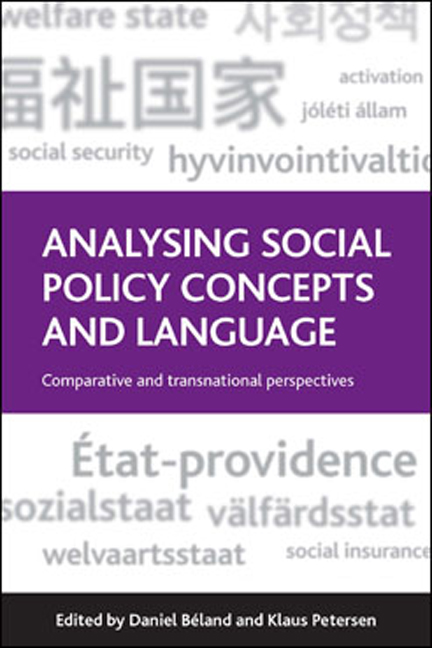Book contents
- Frontmatter
- Contents
- List of figures and tables
- Acknowledgement
- Notes on contributors
- Introduction: social policy concepts and language
- one Social policy language in Denmark and Sweden
- two The changing language of social policy in Hungary and Polan
- three Languages of ‘social policy’ at ‘the EU level’
- four The OECD's search for a new social policy language: from welfare state to active society
- five The discursive power of international organisations: social policy language and concepts in the World Bank and the International Monetary Fund
- six Original and imitated or elusive and limited? Towards a genealogy of the welfare state idea in Britain
- seven Social policy concepts and language in France
- eight The language of social politics in Finland
- nine Germany: constructing the ‘win-win’ society
- ten Conceptual development of welfare and social policy in Japan
- eleven Transition to the ‘universal’ welfare state: the changing meaning of ‘welfare state’ in Korea
- twelve The Dutch ‘caring state’
- thirteen Panacea, problem or perish: social policy language in New Zealand
- fourteen Evolving social policy languages in Spain: what did democracy and EU membership change?
- fifteen Social policy language in the United States
- Conclusion: comparative perspectives on social policy language
- Index
three - Languages of ‘social policy’ at ‘the EU level’
Published online by Cambridge University Press: 04 March 2022
- Frontmatter
- Contents
- List of figures and tables
- Acknowledgement
- Notes on contributors
- Introduction: social policy concepts and language
- one Social policy language in Denmark and Sweden
- two The changing language of social policy in Hungary and Polan
- three Languages of ‘social policy’ at ‘the EU level’
- four The OECD's search for a new social policy language: from welfare state to active society
- five The discursive power of international organisations: social policy language and concepts in the World Bank and the International Monetary Fund
- six Original and imitated or elusive and limited? Towards a genealogy of the welfare state idea in Britain
- seven Social policy concepts and language in France
- eight The language of social politics in Finland
- nine Germany: constructing the ‘win-win’ society
- ten Conceptual development of welfare and social policy in Japan
- eleven Transition to the ‘universal’ welfare state: the changing meaning of ‘welfare state’ in Korea
- twelve The Dutch ‘caring state’
- thirteen Panacea, problem or perish: social policy language in New Zealand
- fourteen Evolving social policy languages in Spain: what did democracy and EU membership change?
- fifteen Social policy language in the United States
- Conclusion: comparative perspectives on social policy language
- Index
Summary
What one could cursorily call the ‘language’ question in European Union (EU) social policy is generally overlooked by social scientists. Under the apparently benign use of one of the varieties of ‘international English’, the EU perhaps provides the clearest illustration of the tendency to blur the frontiers between politics, social science and political communication. This mélange des genres affects the participants in the production of the languages of social policy, the spaces where they craft them, and the ensuing discourses that travel across Europe and beyond. After a short section devoted to the definition of ‘social policy’ at the EU level, we outline a theory of the production and circulation of social policy languages within the borders of the EU. In a third section, we provide examples of this production and circulation of social policy languages.
The empirical base for the chapter is twofold: the first is a reflection originating from the author's continual participation – as a nonnative speaker of English – in various academic forums over the last 20 years. The second is the writing over the same period of a series of monographs about social policy concepts. Most of the time, the sociological unease experienced in ‘international research situations’ (Barbier, 2005) triggered the writing of these monographs, none of which, incidentally, was commissioned. To give an illustration at the start: one of the first experiences of uneasiness occurred with the concept of ‘welfare state’ at a time when the notion was extremely hegemonic (Barbier and Theret, 2001). Concurring with Merrien (1997), we argued that the notion of ‘Etat-providence’ in French was inadequate for many reasons, notably for its focus on the state as the only actor: social protection (la protection sociale, soziale Sicherung, la protezione sociale, and so on) was a more encompassing notion, involving structural social relationships (a ‘nexus’) between politics, economics and the family. In France and the United States, it found its place gradually as a notion complementary to, but also competing with, social security or sécurité sociale (Barbier, 2008, ch1; see also chapter seven, this volume, by Daniel Béland). Social protection was also a more useful and adequate notion than the British-centric ‘welfare state’, with its specific origin and history.
- Type
- Chapter
- Information
- Analysing Social Policy Concepts and LanguageComparative and Transnational Perspectives, pp. 59 - 80Publisher: Bristol University PressPrint publication year: 2014
- 2
- Cited by

